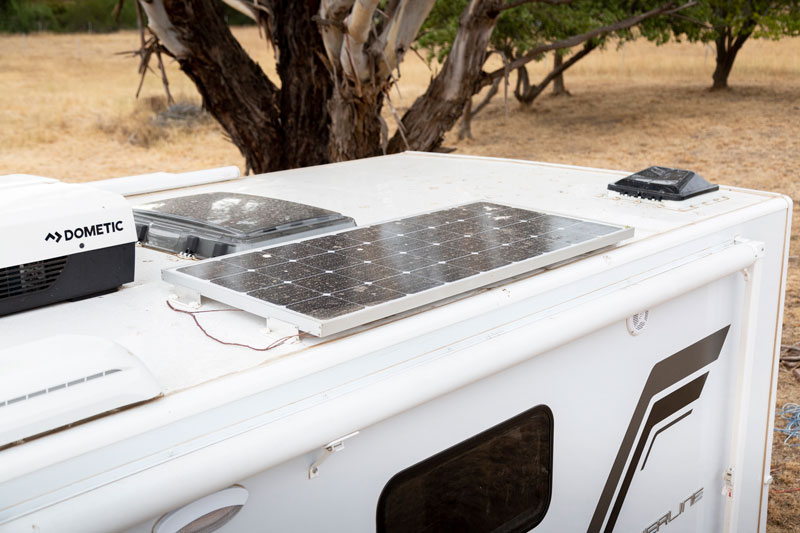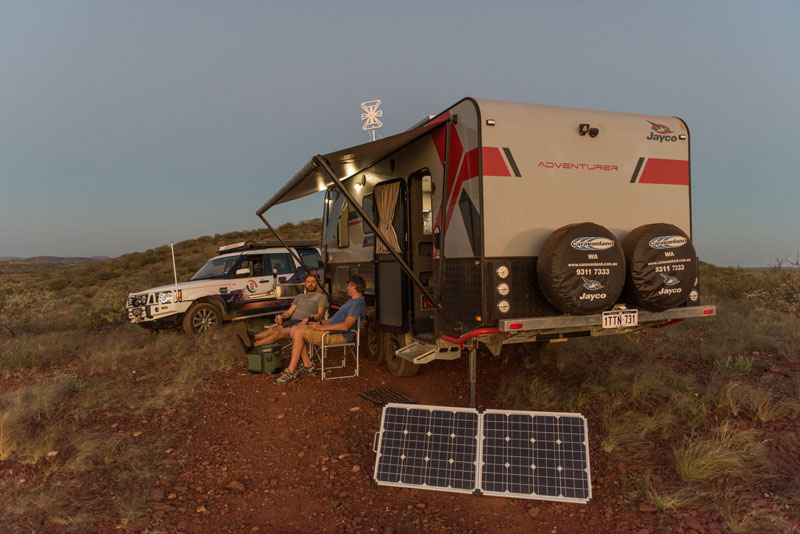Solar power or generator: which is right for me?
There’s always a heated debate around the campfire over different types of off-grid power sources. Here, we drill down into some of the pros and cons of solar power and generators to help you make up your mind.
It’s the burning question that’s been thrown around the campfire since time began – well, actually, probably not that long, since portable camping power hasn’t been around that long. Solar vs. generator – which is better for camping?
If there was an easy answer to the question, we could probably end this article right here but, the fact of the matter is, it’s a complicated question and the answer will differ depending on your individual circumstances.
NOISE
There’s nothing worse than having the peace and serenity of your favourite campsite shattered by the loud, incessant roaring of your camp neighbour’s generator 12 hours a day – or even just a couple of hours, if it’s at an inappropriate time. Gennies may be good for a lot of things but keeping the peace isn’t one of them. They are loud – so loud, in fact, they have been banned from many national parks and holiday park campsites. Solar, on the other hand, is whisper quiet. So quiet you won’t even know the panels are up there, quietly sucking in solar power to keep your campsite running. Solar definitely comes out on top in the noise stakes.
COST
There is a reasonable set-up cost for both solar and generators, however, it’s generally accepted that a full solar set-up would cost more than a generator for personal use. For both items, cost will usually be relative to size, so the larger capacity solar panels or gennie you choose, the higher the cost. Plus, you need to factor in there is the ongoing fuel cost of running a generator. Once set up, solar has no further running cost so that’s a big tick in its favour.
ENVIRONMENTAL FACTORS
The difference here is fairly obvious – one creates power by burning petrol, the other by harnessing natural solar power, which creates zero emissions, unlike a generator.
CAPACITY
It can be difficult for RVers to run their vehicle solely off solar power if they are also keen to run high-draw appliances such as microwaves, air-conditioners, coffee machines, etc. A standard 200-300W solar setup just wouldn’t be up to the job; though larger, high-end vans would often come with a much large capacity system of up to 1100W or more. But for many, solar alone won’t cut it if they like their accessories and RVers may require a generator and inverter anyway for their larger 240V appliances.
WEATHER
If you want a power source which will work in all conditions, you’ll need to look for a generator. The energy output from solar panels in heavily dependent on weather and while, contrary to popular belief, they will still put out energy on overcast days, it will be less than the optimal amount. Rain or shade will compromise that even further. A generator, however, has no such limitations and will work rain, hail, or shine.
MAINTENANCE
Solar panels win the day when it comes to maintenance as they need virtually none, other than a clean once in a while. Generators, on the other hand, require regular servicing, like most mechanical appliances, so there are the time and cost factors associated with that to consider.
RESTRICTIONS
There are location and placement issues associated with both solar panels and generators, so understanding the restrictions of each type of power source before you purchase is essential. Generators are now banned in many national park campsites so, if national park camping is your thing, you’ll have to take that into account. Even if you find a free camp or a caravan park that will let you use your generator, you’ll have to find a place to put it where the noise and emissions will not negatively impact any camping neighbours you may have. Further to that, most caravan parks and even many free camps will have restrictions on the amount of time and time of day that generators can be used. Some will allow them during all daylight hours while others will limit their use to an hour or two a day. So if you’re relying on your gennie to help make you a coffee before you pack up camp at 5am, you might have to think again.
Due to their silent, emission-free operation, solar panels can be used anywhere. However, if they are roof-mounted to your RV, this will impact where you park and restrict your choices of campsite. If you’re intending to use your solar panels to output energy, you’ll have to ensure you’re not parked in the shade (unless you’re using portable panels).
SIZE/WEIGHT
Space is usually the limiting factor for a caravan or motorhome solar power system, as you are limited by how many solar panels you can fit on your roof. Most mid-range caravans would come with two solar panels but high-end vans could have up to seven, eight or more – it’s just a matter of being creative with their placement. Weight is another consideration. Once mounted to the roof of your RV, your solar panels will eat into your available payload, reducing the amount of other gear you can carry.
A gennie, on the other hand, can be carried in the tow vehicle, if required, reducing the weight impact on the van (but transferring it to the vehicle). However, their bulky shape and size may prove difficult to accommodate and many modern vans are coming with built-in generator boxes and slides specifically designed to carry them. The relatively heavy weight of a generator can be an issue, as well, as users need to be able to lift them down from the vehicle or van and carry them to the location they wish to use them, so a moderate level of strength and fitness is required.
PORTABILITY
If we look at portable or folding solar panels compared to generators, then we could probably call this one a draw. Both can be moved around and situated wherever the camper desires. On the other hand, most roof-mounted solar panels are immovable, however, some modern panels can tilt or rotate in order to follow the sun’s path.
So, as you can see, there are many varying factors to consider when it comes to choosing a solar power setup or a generator for your camping adventures. There is no right or wrong answer and different applications will suit different campers; what’s important is picking the right system for you and using it to power amazing adventures off the grid.
Like this Post? Share it!






